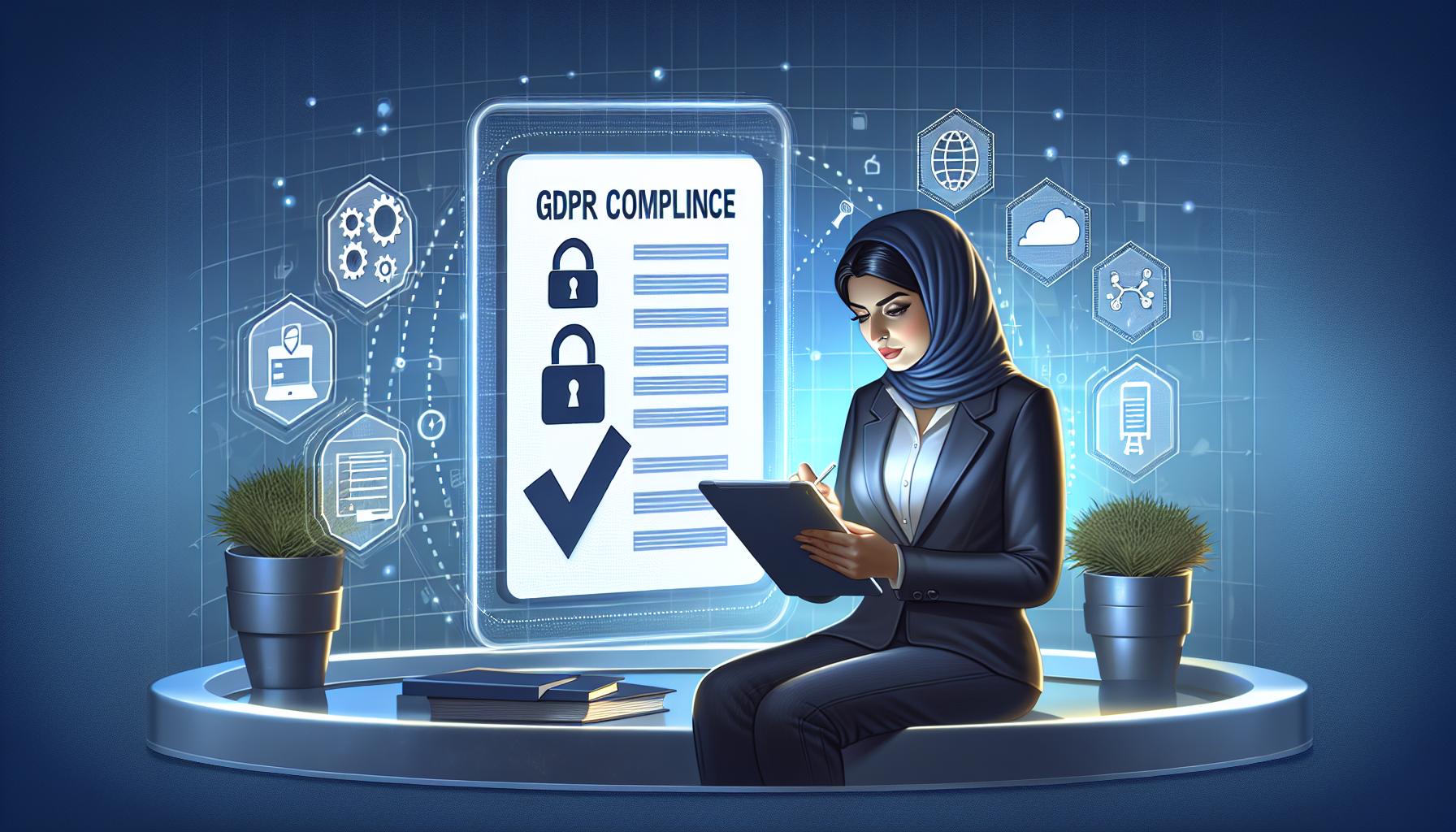Navigating the complexities of GDPR compliance can seem like a daunting task. As a seasoned expert in data protection, I’ve come to understand the ins and outs of these regulations, and I’m here to break them down for you. From small startups to large corporations, understanding GDPR is crucial for businesses operating in or with the European Union.
In this guide, I’ll share my insights on the key principles of GDPR compliance, offering practical advice on how to ensure your business is not only compliant but also thriving in this new regulatory environment. Whether you’re just starting your GDPR journey or looking to refine your existing policies, I’ve got you covered with clear, knowledgeable, and confident guidance.
Understanding GDPR Regulations
As I dive deeper into GDPR compliance guidelines, it’s vital for business owners and marketing directors of e-commerce brands across the UK to grasp the complexities of GDPR regulations. My journey in navigating these waters has taught me that understanding is the first step towards compliance.
GDPR, or the General Data Protection Regulation, is a framework set by the European Union to ensure data protection and privacy for all individuals within the EU and the European Economic Area. It also addresses the transfer of personal data outside the EU and EEA areas. For businesses, this means there are stringent rules to follow when handling customer data, especially for e-commerce entities dealing with vast amounts of personal information daily.
Here are a few critical aspects of GDPR that you should know:
- Consent is Crucial: Under GDPR, explicit consent to collect and process personal data is mandatory. This means pre-ticked boxes or any form of assumed consent won’t do; your customers must actively opt-in.
- Right to Access: Individuals have the right to access their data and understand how it’s being used. As a business, you must be prepared to provide full transparency upon request.
- Data Portability: The regulation allows for data portability, meaning individuals can request a copy of their data in a common format. This empowers users but adds an extra layer of responsibility for businesses.
- Breach Notification: In the event of a data breach, GDPR mandates that affected individuals and the relevant data protection authority are notified within 72 hours, underscoring the need for robust security measures.
The stakes are high, with penalties for non-compliance reaching up to 20 million Euros or 4% of the company’s global turnover, whichever is higher.
To ensure compliance, businesses must conduct thorough data audits, update privacy policies, and implement stringent data protection measures. This includes appointing a Data Protection Officer (DPO) if your processing operations require regular and systematic monitoring of data subjects on a large scale or involve sensitive data.
For e-commerce brands, adapting to these regulations is non-negotiable. It’s not only about avoiding fines but also about building trust with your customers. Demonstrating that you value and protect their privacy can significantly enhance customer loyalty and brand reputation.
In the next section, I’ll dive into practical steps to ensure your e-commerce business is GDPR compliant, focusing on tangible actions you can take to safeguard your customer’s data and uphold the highest standards of privacy and security.
Key Principles of GDPR Compliance

Navigating the intricacies of GDPR compliance can feel overwhelming, but understanding its core principles simplifies the process, especially for e-commerce businesses. I’ve distilled the crucial GDPR compliance guidelines into manageable insights that directly address the needs of business owners and marketing directors of e-commerce brands across the UK.
Lawfulness, Fairness, and Transparency are at the heart of GDPR. For me, this means ensuring that every data processing activity within my e-commerce business has a legal basis, such as consent or legitimate interest. Additionally, it’s imperative to communicate clearly with users about what data is collected, why it’s collected, and how it’s used. This transparency builds trust, a key component of customer loyalty in the digital age.
Data Minimization is a principle that encourages us to only collect and process data that’s absolutely necessary for the intended purpose. Initially, this might seem restrictive, but it’s made my business more focused and efficient. By collecting only what’s necessary, I’ve streamlined operations and reduced the risk of data breaches.
Accuracy, another fundamental principle, requires that personal data be kept accurate and up to date. This isn’t just about compliance; it directly impacts the effectiveness of marketing campaigns and the overall customer experience. Regularly validating and updating customer information ensures that marketing efforts are targeted and effective.
Storage Limitation dictates that personal data should not be kept in a form which permits identification of data subjects for longer than necessary. Implementing automated data purging processes has aided my business in adhering to this principle while maintaining a lean database.
Integrity and Confidentiality ensure that personal data is processed in a manner that ensures appropriate security, including protection against unauthorised or unlawful processing. Investing in high-quality cybersecurity measures and training staff on data protection best practices have been critical steps for my business.
Accountability is the principle that ties all others together. It requires that businesses can demonstrate compliance with the GDPR principles. This has prompted me to establish robust internal record-keeping practices and to conduct regular data protection impact assessments.
Navigating GDPR for Small Startups

As a business owner of a burgeoning startup, I’ve navigated the complex landscape of GDPR compliance firsthand. Understanding and implementing GDPR guidelines can be daunting, especially for small startups where resources are tight and technical expertise may be limited. Yet, it’s imperative for ensuring customer trust and avoiding hefty penalties. Here, I’ll share some practical steps and insights that have helped me comply with GDPR, tailored specifically for small e-commerce brands in the UK.
First and foremost, identify what data you’re collecting. Startups often unknowingly collect personal information beyond what’s necessary. Conduct an audit of the data you gather across your operations, from customer purchases to newsletter sign-ups. This exercise is foundational in defining your data processing activities, a critical first step to GDPR adherence.
Next, focus on obtaining explicit consent. GDPR mandates that consent must be clear, concise, and specific. This means re-evaluating how you request consent on your website or app. Make sure your consent forms are easily understandable and that customers can freely opt-in or out. It’s not just about compliance; it’s about building a relationship based on trust with your customers.
Another critical aspect is ensuring data security. Startups often become so preoccupied with growth that data security might not seem like an immediate priority. However, a data breach can be detrimental, not just in terms of penalties but also in lost customer trust. Invest in robust cybersecurity measures, such as encrypted data storage and secure user authentication processes. Regular audits and updates to your security systems will help protect sensitive customer information and shield your startup from potential threats.
Lastly, it’s essential to educate your team. GDPR compliance is a team effort. Ensure every member, from marketing to IT, understands their role in maintaining compliance. Regular training sessions and updates on data protection best practices can make a significant difference in how well your startup navigates GDPR regulations.
| Key Focus Area | Why It’s Important |
|---|---|
| Data Identification | Basis for all GDPR compliance activities |
| Explicit Consent | Builds trust and ensures legal compliance |
| Data Security | Protects against breaches and penalties |
| Team Education | Ensures widespread understanding and implementation |
Ensuring GDPR Compliance for Large Corporations

As a business owner and marketer within the e-commerce sector, I understand the nuanced complexities large corporations face when aligning their operations with GDPR compliance. It’s not merely a checklist but a comprehensive approach to handling customer data with the utmost respect and security. From my experience, ensuring GDPR compliance within larger entities involves a strategic blend of organisational change, technological innovation, and constant vigilance.
First and foremost, it’s crucial to conduct a Data Audit. I can’t stress enough the importance of knowing exactly what kind of data you’re collecting, storing, and processing. Large corporations often handle vast amounts of data, making it easy to lose track. By conducting a thorough data audit, you identify critical touchpoints and can streamline data management practices, ensuring that only necessary data is collected and retained.
Implementing Robust Data Protection Measures is the next step. The sophistication of cyber threats has grown, and so should our defences. Investing in state-of-the-art cybersecurity technologies and protocols is non-negotiable. However, technology alone isn’t enough. Large corporations need to foster a culture of data security. Regular training sessions for staff on the latest data security practices and GDPR compliance are essential. It’s all about building a proactive rather than a reactive culture.
Another pivotal aspect is Managing Third-party Risks. In our interconnected world, e-commerce businesses often share data with third parties, including suppliers, vendors, and analytics companies. It’s crucial to ensure that these partners also comply with GDPR. Binding corporate rules (BCRs) and standard contractual clauses (SCCs) are effective tools in managing these external risks.
Transparency and Consent are at the heart of GDPR. I always advise crafting clear, concise, and easily accessible privacy policies. They should detail how customer data is used and provide options for customers to control their data. Obtaining explicit consent has never been more critical, with pre-ticked boxes no longer being considered valid consent under GDPR. Every marketing approach, especially when it involves personal data, needs meticulous attention to ensure adherence.
Lastly, setting up a Data Protection Office (DPO) is advisable for larger corporations. A dedicated team or individual who understands the intricacies of GDPR can oversee compliance efforts, manage data protection strategies, and act as a point of contact for regulatory authorities.
| Key Action Points for GDPR Compliance | Description |
|---|---|
Thriving in the New Regulatory Environment

Adapting to the ever-evolving landscape of data protection, especially under the GDPR, can seem daunting at first. However, I’ve found that by embracing these changes, businesses can unlock new opportunities for growth and customer loyalty. It’s all about how we perceive and react to these regulations.
Firstly, it’s clear that GDPR compliance is not just a legal obligation but a Strategic Advantage. In my experience, customers are increasingly savvy about their data rights. They’re more likely to trust and engage with brands that respect and protect their privacy. This trust is crucial for sustained growth in the highly competitive e-commerce sector. By demonstrating a commitment to data protection, businesses can differentiate themselves in a crowded market.
Another key observation I’ve made is the importance of Data Minimization. The GDPR encourages organisations to only collect the data they need. This ethos not only aligns with compliance but also streamlines operations. By focusing on essential data, businesses can improve efficiency and reduce the risk of data breaches. The simplification of data management processes allows for a more focused approach to marketing strategies, ensuring that efforts are targeted and effective.
Embracing Technology
Leveraging the right technology plays a pivotal role in navigating GDPR compliance. Tools that support data encryption, consent management, and regular audits are invaluable. Investing in such solutions can dramatically reduce the complexity and cost of compliance efforts.
Automation is another area I’ve found incredibly beneficial. Automated systems can ensure that consent is correctly obtained and recorded, data is accurately classified, and access is securely managed. This not only aids compliance but also enhances overall operational efficiency.
Continuous Education and Training
A key factor in thriving amidst these regulations is fostering a culture of continuous learning within your organisation. GDPR compliance is not a one-time effort; it’s an ongoing process. Regular training sessions for staff ensure that everyone is up-to-date on the latest requirements and best practices. This collective awareness is vital in preventing data breaches and maintaining a strong stance on data protection.
Proactively Managing Data Breaches
Despite the best precautions, data breaches can still occur. It’s how businesses respond to these incidents that matters. A well-planned incident response strategy can mitigate negative impacts and salvage customer trust. Swift action, transparency, and clear communication are essential in these situations.
Conclusion
Navigating GDPR compliance might seem daunting at first but it’s an invaluable journey towards securing customer trust and ensuring operational efficiency. I’ve shared insights on leveraging GDPR as a strategic advantage, the critical role of data minimisation, and the importance of adopting technology for streamlined compliance. Moreover, I’ve highlighted the necessity of continuous education and a robust incident response strategy. Embracing these practices not only aligns with legal requirements but also positions your business as a trustworthy and efficient player in the digital marketplace. Remember, GDPR compliance isn’t a one-time task but an ongoing commitment to protecting data and fostering transparency. It’s a path worth taking for the longevity and success of your business.
Frequently Asked Questions
What is GDPR, and why is it important for e-commerce?
GDPR stands for General Data Protection Regulation. It’s crucial for e-commerce because it mandates how companies should handle consumer data, enhancing user trust and loyalty by ensuring their data is protected and used responsibly.
How can GDPR compliance improve customer trust?
GDPR compliance demonstrates a company’s commitment to protecting consumer data, thereby building trust. Companies that transparently manage data and respect user privacy can significantly enhance customer loyalty and trust in the competitive e-commerce landscape.
What is data minimisation, and why does it matter?
Data minimisation is a GDPR principle that encourages collecting only the data necessary for a specific purpose. It matters because it helps reduce the risk of data breaches and enhances operational efficiency by streamlining data management processes.
How does technology facilitate GDPR compliance?
Technology, like data encryption and automation tools, plays a critical role in GDPR compliance by securing data and simplifying the compliance process. These technologies can help automate repetitive tasks and ensure data is protected against unauthorised access.
Why is ongoing education important for GDPR compliance?
Ongoing education and training are essential because GDPR compliance is not a one-time task but a continuous process. Keeping teams informed about data protection best practices and regulatory updates ensures that an organisation remains compliant over time.
How should companies handle data breaches under GDPR?
Companies should manage data breaches by having a well-prepared incident response strategy. This strategy should include swift action to mitigate the breach, transparency with affected users, and clear communication about the steps taken to resolve the issue and prevent future incidents.




